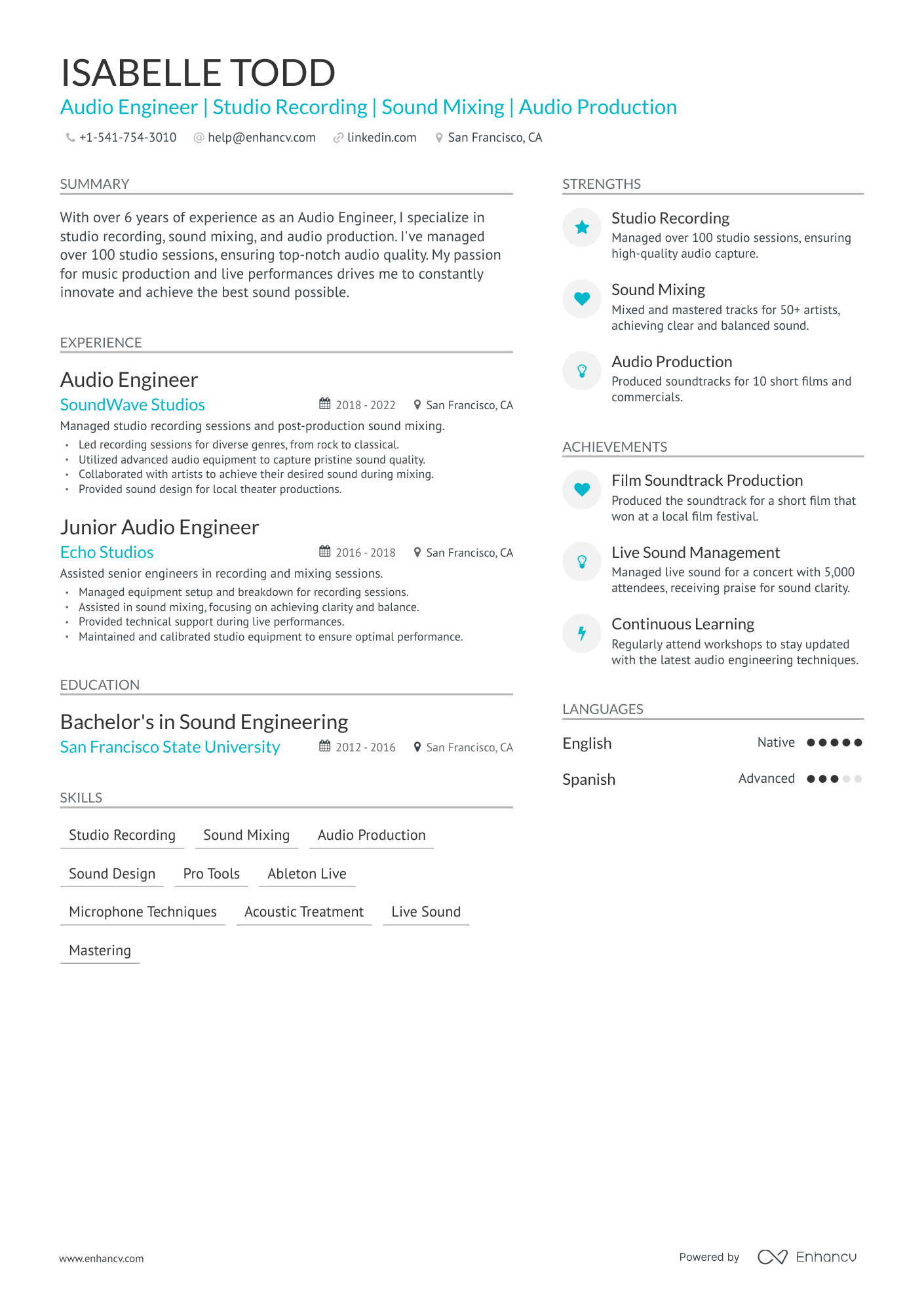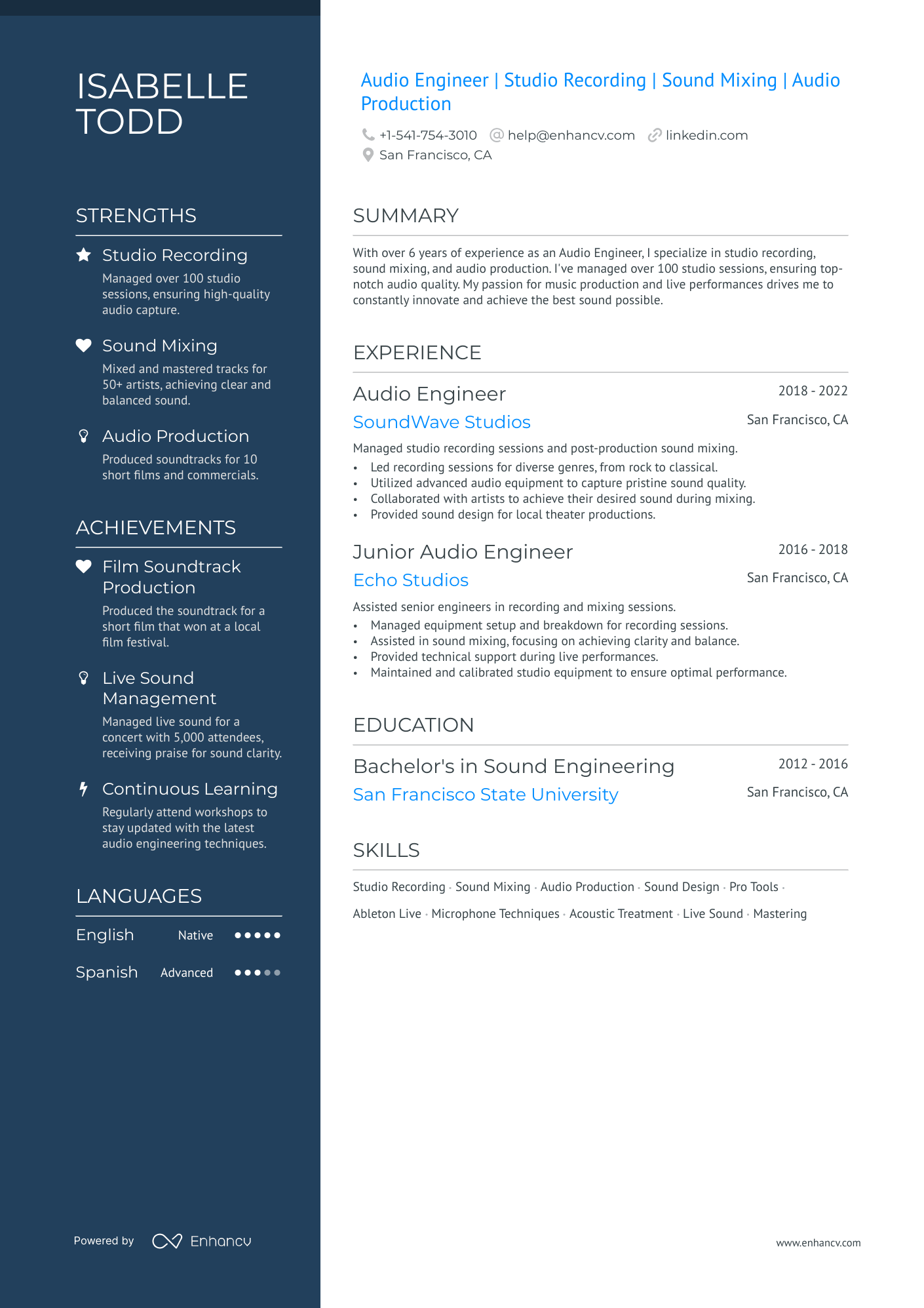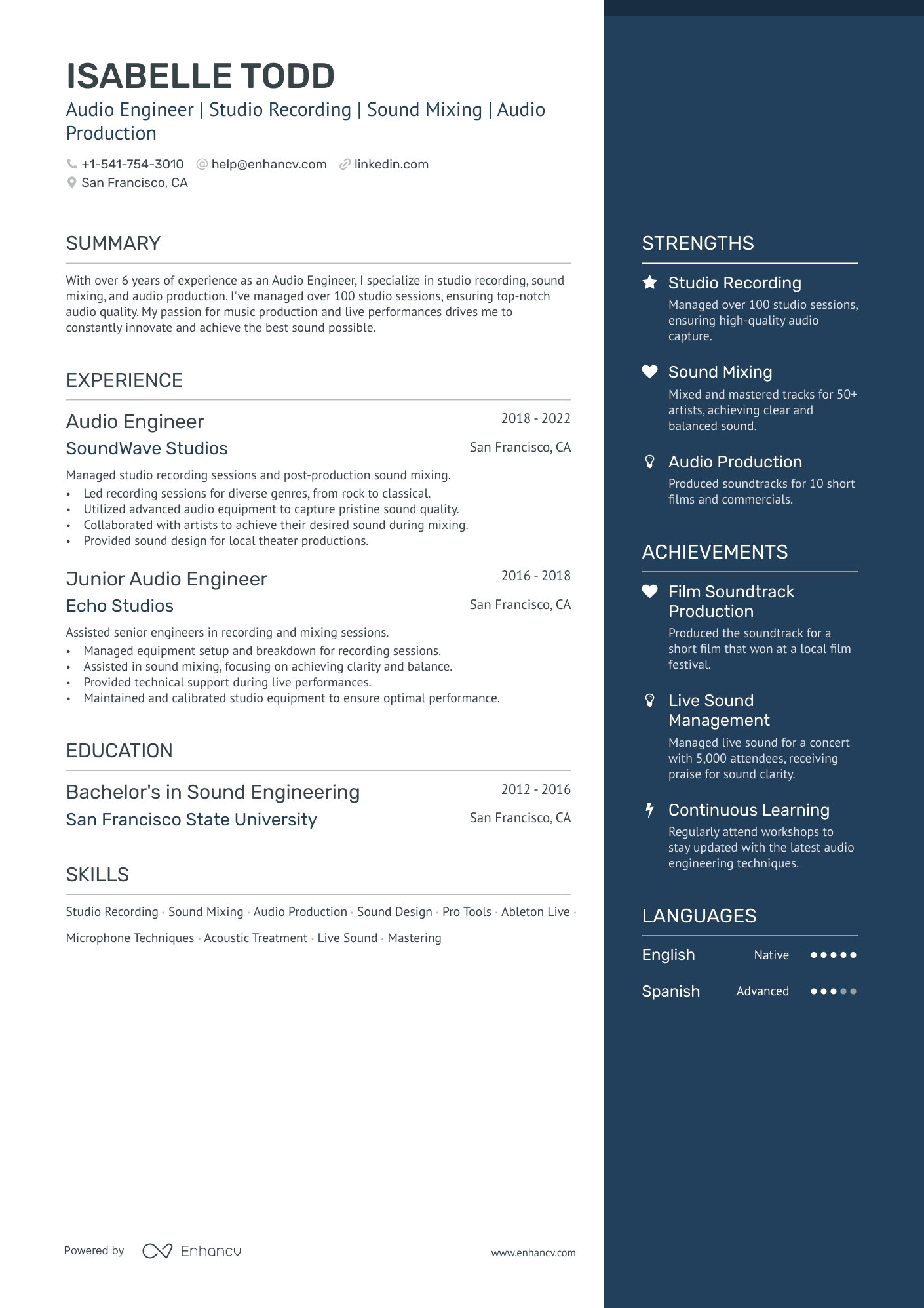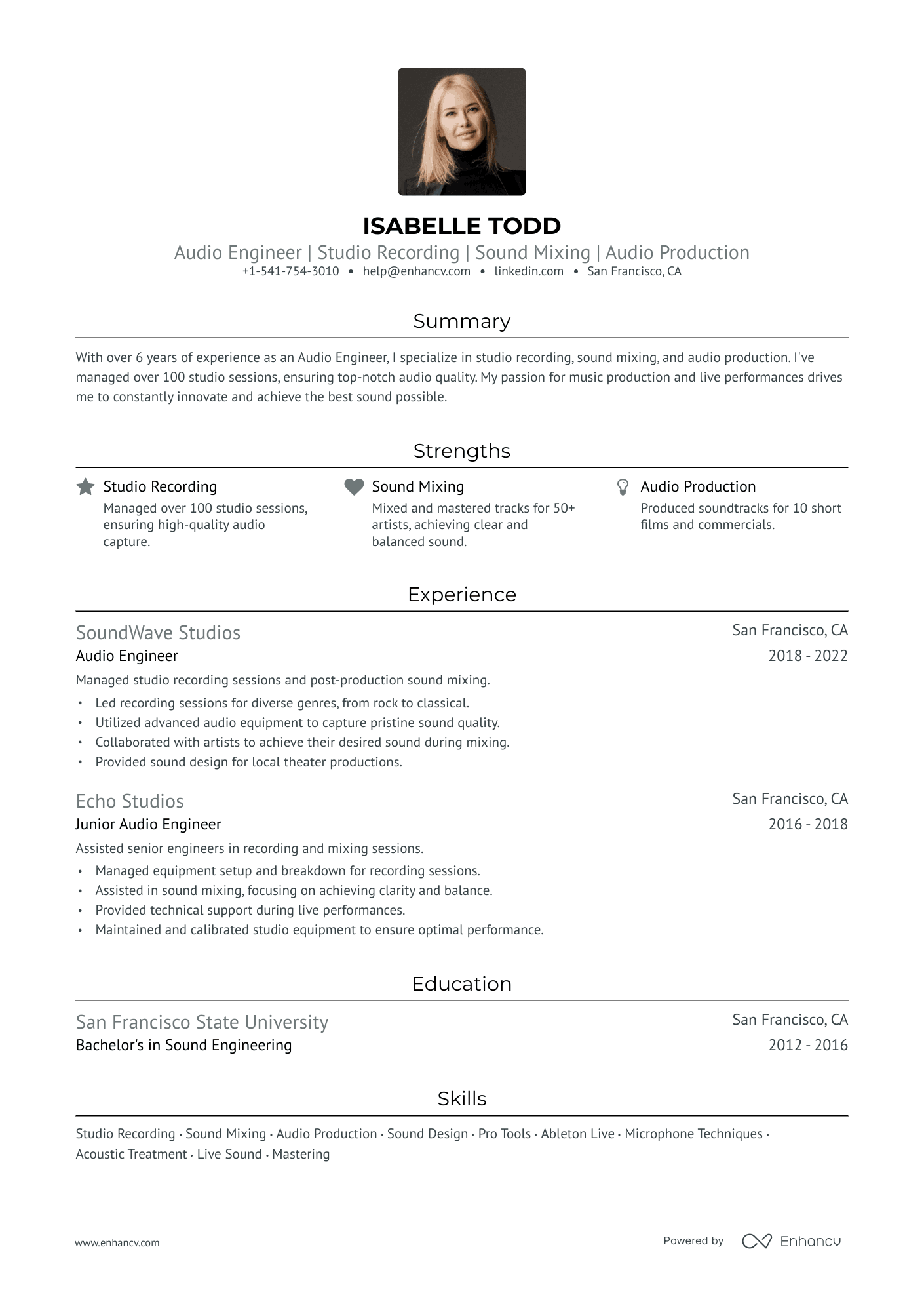You’ve just heard there’s an open position for an audio engineer at the record label of your dreams.
They’re a global leader in the music industry, and they’ve created albums from your favourite bands.
Joining their team would be the highlight of your career so far.
You would get to record, edit and mix the recordings of your favourite musicians, every single day. What more could you ask for?
But first you need to impress the hiring manager with the perfect resume that shows them you’re the candidate of their dreams.
You may have all the passion and drive to land this job, but you need to show them with a resume that stands out from the crowd. Because there’s no doubt this job is in high demand from other audio engineers.
Read this guide to learn how to put together an audio engineer resume that lands you an interview.
This is what we’ll teach you.
Our audio engineer resume guide will teach you:
- Which resume format to use depending on your experience level
- How to personalize your resume for the job you’re applying for
- 8+ ways to explain your duties as an audio engineer
- 21+ examples of technical and soft skills to input in your resume
Looking for related resumes?
Important points about writing an audio engineer resume
Being a successful audio engineer requires expertise and organization.
Hiring managers are looking for candidates that have both the technical and soft skills needed to produce excellent results.
Your audio engineering resume should prove you can:
- Manage multiple projects at once
- Work well with a team
- Take the lead on managing the entire audio systems process
What is the best resume format to show you’re right for the job?
If you already have experience as an audio engineer, use a reverse chronological resume format. This resume layout emphasizes your experience more than the other sections.
If you just completed your education and you’re still low on experience, use the functional resume layout. This format emphasizes your education, qualifications and skills, putting less pressure on your experience.
Here's what a hiring manager will look for in your resume
- What area of audio engineering are you most experienced in?
- What tools and programs are you most proficient with?
- Do you have the necessary soft skills to excel? (Examples: teamwork and organization)
- Do you have any formal education in audio engineering?
Answering these questions will help the hiring manager decide if they want to read further. It all begins with an informative resume header.
How to write an informative header for your audio engineer resume
Your resume header is the first section that hiring managers will read over after picking up your resume.
Let’s say you’re applying to a national television broadcasting company that produces daily talk shows.
Here’s an average resume header that you’ll see from most candidates applying:
This example has the essentials: name, location, title and email - it won’t stand out in a pile of resumes.
You can add extra credibility to your resume header with a few simple additions:
- A more descriptive title that highlights your area of specialty
- Your LinkedIn profile URL
With just a few additions, this header goes from average to outstanding. It lists the area of speciality (Television Broadcasting), and includes a link to their LinkedIn profile, so the hiring manager can take a look if they want to.
What you should include in your audio engineer professional summary
The summary section of your audio engineer resume should do two things:
- Clearly display who you are and why you’re qualified for the job
- Prove you’ve done your research about the specific job you’re applying for
Experience is the most important factor the hiring manager will consider when reading your resume. Check the job description to see how many years of experience is required, and list how many you have directly in your summary.
Mention what area of audio engineering you’re most familiar with, unless you have experience in all areas. For example, you may specialize in audio engineering for television and film broadcasting. Or maybe you have the most experience in managing the sound performance for live festivals.
When applying for an audio engineering position in a specific area, you should list your experience with that specialization in your summary.
Showing your genuine interest in the job you’re applying for, and to prove that you’ve done your research, you should read carefully through the job description and pick up on the keywords used.
Do they mention specific software programs like Pro Tools? What tasks will you have to do on the job - maintain and repair audio equipment or add audio to video? Highlight some of those key points in your summary.
Doing this will help your application move fast applicant tracking systems that scan your resume for relevant keywords.
Let’s show you two examples of audio engineer resume summaries. The first one needs a bit of work, and we’ll tell you why. The second summary is much stronger.
This example doesn’t achieve those two goals we mentioned before:
It doesn’t clearly display why the candidate is qualified for the job. It only just states that the candidate wants any job.
It doesn’t prove that they’ve done their research about the role. The summary is vague and general. There are no relevant keywords.
Here’s an example of an excellent audio engineer summary:
This audio engineering summary has it all:
- Lists how many years of experience the candidate has
- Mentions their area of expertise (live events)
- Personalized to the job, with relevant keywords found in the job description
- Demonstrates their eagerness to join that specific team
Pro tip
Mention your area of expertise in audio engineering. Are you most familiar with live events? In-studio recordings? Television broadcasting? Let the recruiter know in your summary!
How to write about your audio engineer experience
The experience section of your resume will be the most important to hiring managers, so it’s essential that you get it right.
This section is meant to accomplish two key goals:
- Discuss your role and responsibilities on the job
- Describe the positive impact you made for the client or company
Take a look at the responsibilities listed in the job posting to get an idea of what experience they expect from their ideal candidate.
For example, does the job role say you’ll need to work with automatic speech recognition systems? If you’ve done that before, mention it in your experience descriptions.
Do you need to create PA diagrams? Or work on specific consoles, like Avid SC48? Highlight times you have done so in the past!
As an audio engineer, you’ll be working with various different digital programs to do your work. Mention what software you used in your past roles.
Most applicants focus only on their technical skills in their resume, underestimating the importance of your soft skills as well.
Demonstrating in the experience section that you’re a well-rounded candidate, with both technical and soft skills, will set you apart from all the other average resumes.
Later on this guide, we’ll give you a list of 20+ skills to pick and choose from.
Let’s take a look at two examples of audio engineer resumes to see our tips in action.
2 audio engineer resume experience samples
- •Managed audio recording process
- •Worked with musicians and bands
- •Created audio mixes
This example doesn’t say anything about the candidate’s competency as an audio engineer. They simply list their responsibilities in their role, but they say nothing about the impact they made.
This example won’t give the hiring manager any confidence that they're right for the job.
Here’s an example that’s more likely to get you an interview.
- •Set up, operated and troubleshooted audio equipment (amplifiers, mixing consoles, monitors, etc.)
- •Recorded and mixed 100+ records for high-profile clients
- •Used Pro Tools, Cool Edit and audio restoration software
- •Mixed live audio with 30+ inputs and monitors with 10+ mixes
- •Notable achievement: mixed Grammy-award winning album
This example is more like it.
This candidate uses real numbers in the resume to support their points, mentions specific software they used in the role, and they highlighted their most notable achievement to prove the positive impact they made at the company.
How to describe the duties of an audio engineer on a resume
Here are some examples of audio engineer responsibilities you can add to your resume:
- Manage sound recording process
- Set up audio equipment in venues and recording studios
- Investigate the venue to determine sound quality needs
- Troubleshoot problematic equipment and find solutions
- Work with clients to help them achieve their sound-related goals
- Use digital software to mix sound recordings
- Work with loudspeakers, soundboards and amplifiers
- Edit sound in analog and digital formats
Does your audio engineer resume need an education section?
While there’s no specific educational requirement for audio engineers, having a degree or diploma can put you ahead of the crowd.
If you have any kind of formal training in audio engineering, it’s essential that you list it in the education section. This can range from taking relevant classes in high school/college, completing a certification or getting a Bachelor’s degree.
Many colleges and universities offer relevant Associate’s and Bachelor’s degrees, such as in Music Technology or Audio Production.
What if you don’t have any formal education?
No problem!
The good news is that experience can replace education when searching for an audio engineering job. If you have a significant amount of hands-on experience in audio engineering already, you don’t have to emphasize your education as much.
What skills do employers look for in an audio engineer resume?
Audio engineering is a technical job that requires you to know the in’s and out’s of managing the sound capturing process, whether it’s live or in-studio.
Audio engineers constantly work with other people in the industry, whether it's musicians, venues, or managers, so you also need to prove your people skills in your resume.
The best audio engineer is well-rounded, with the right mix of technical and soft skills. Soft skills set you apart from other audio engineers in the hiring process.
You use your technical skills to ensure great sound quality. You work with your clients to ensure their goals are being met, putting your soft skills to use.
This list of 21 technical and soft skills will give you an idea of what you need to highlight on your audio engineer resume.
16 technical skills to include on an audio engineer resume
- Audio Signal Processing
- Audio Restoration Software (eg. iZotope RX6)
- Analog Sound Editing
- Digital Sound Editing
- Instrument & Voice Recording
- Digital Mixing Software
- MIDI Applications
- Pro Tools
- DSP
- Cool Edit
- Logic
- Nuendo
- Sound Reinforcement
- Plugins (Waves, FabFilter, Universal Audio)
- Adobe Creative Cloud
- Microsoft Office Suite
5 soft skills to include on an audio engineer resume
- Problem solving & troubleshooting
- Working with clients
- Team collaboration
- Communication skills (written & verbal)
- Project management
"An audio engineer’s principle responsibilities these days are to keep everything connected and moving. There are a lot of different types of personalities in the room at any given time, and their main function if they’re working in the typical configuration, producer, artist, songwriter, is to make sure everybody is connected together and music keeps flowing."
Cameell Hanna, Audio Engineer at Serenity West Recording - Los Angeles
Key points for the best audio engineer resume
- Read the job description carefully and use the same keywords throughout your resume
- Highlight your specialty as an audio engineer, whether it’s live events or another area
- List the software programs you’re most familiar with using, such as Nuendo or Cool Edit
- Emphasize the soft skills you need to be a successful audio engineer, such as your ability to work on multiple projects and collaborate with other team members




